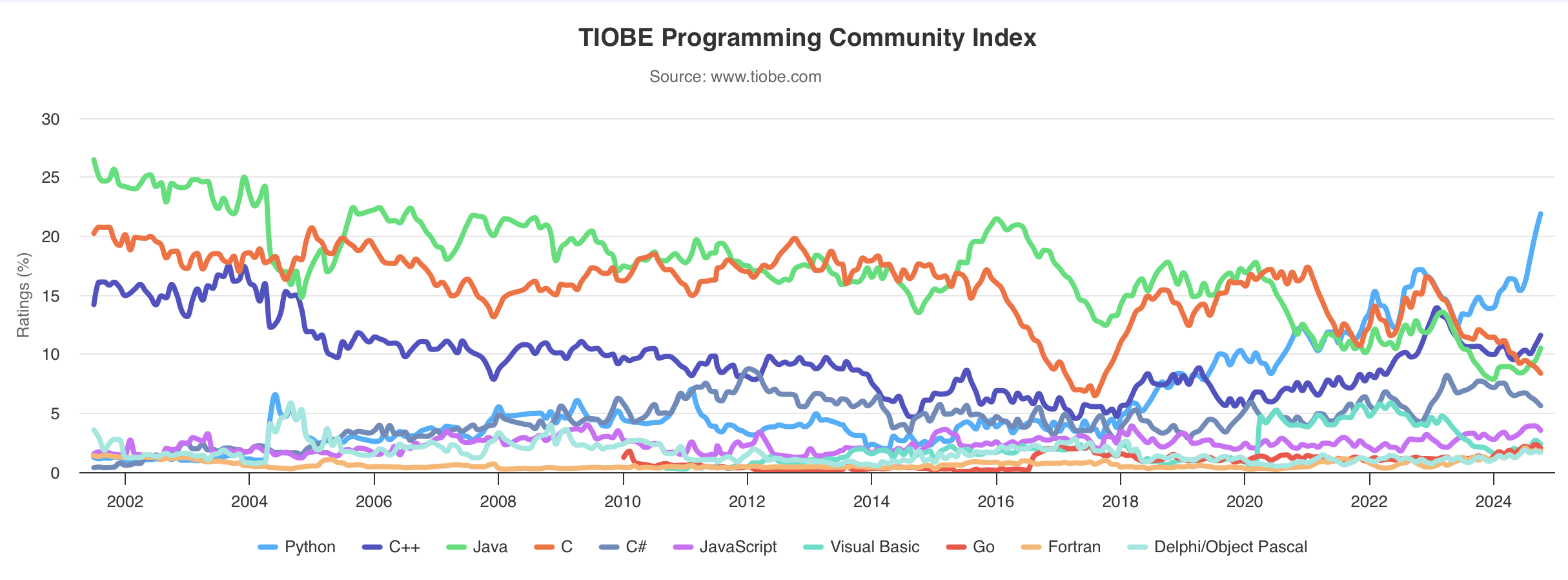Wir nutzen Cookies auf unserer Website. Einige davon sind zwingend notwendig, andere erhöhen den Funktionsumfang der Seite und damit auch den Komfort des Besuchs. Optionale Cookies können hier akzeptiert oder abgelehnt werden. Datenschutz

Python ist eine vielseitige, interpretierte Programmiersprache, die sich durch ihre klare und leicht verständliche Syntax auszeichnet. Sie unterstützt mehrere Programmierparadigmen, wie objektorientiertes, funktionales und prozedurales Programmieren, und verfügt über eine große Standardbibliothek für vielfältige Aufgaben. Aufgrund ihrer Flexibilität und umfangreichen Community wird Python in vielen Bereichen eingesetzt, darunter Webentwicklung, Datenanalyse, maschinelles Lernen und Automatisierung.
Python gilt als eine der besten Optionen für Einsteiger in die Programmierung. Das bestätigt auch der TIOBE-Index, der die Relevanz verschiedener Programmiersprachen anhand von Suchmaschinenergebnissen und Online-Aktivitäten misst. Derzeit thront Python an der Spitze des Rankings, was seine enorme Beliebtheit und vielseitigen Anwendungsmöglichkeiten unterstreicht. Mit seiner klaren Syntax und umfangreichen Bibliotheken ist es ideal für Anfänger, die in die Programmierung einsteigen möchten.

Bildquelle: https://www.tiobe.com/tiobe-index/ (aufgerufen am 27.10.2024)
Das wichtigste zuerst: Die Python Programmiersprache ist einfach zu lernen und zu lesen. Das erleichtert insbesondere Menschen ohne vorherige Programmiererfahrung den Einstieg. Der Syntax erinnert an die englische Sprache und ist im Vergleich zu anderen Programmiersprachen sehr einfach zu verstehen.
Python ist sehr Vielseitig! Von der Webentwicklung bis hin zum maschinellen Lernen und künstlicher Intelligenz kann nahezu jedes Projekt in Python realisiert werden. Die Standardbibliothek ist sehr umfangreich und eine große und engagierte Entwicklergemeinschaft stellt zusätzliche Bibliotheken und Frameworks zum Download zur Verfügung. Das führt dazu, dass sich Python einer stetig wachsenden Beliebtheit erfreut!
Python ist perfekt zum 'rapid prototyping' geeignet. Da Python bewusst benutzerfreundlich gehalten wurde, können Ideen und Konzepte in sehr kurzer Zeit programmiert und getestet werden. Dies bezeichnet man als 'rapid prototyping'. Der Programmierer / die Programmiererin kann so in kurzer Zeit eine Vielzahl an Ideen umsetzen und vergleichen.
Python ist gratis! Sowohl die volle Funktionalität der Standardbibliothek, als auch die bereitgestellten Frameworks unabhängiger Entwicklerteams sind (bis auf einige sehr spezielle Ausnahmen) unentgeltlich erhältlich. Außer einem Laptop benötigt man nichts weiter um durchstarten zu können!
Python übernimmt automatisch viele Aufgaben die einen Großteil der Schwierigkeit beim Programmieren in anderen Sprachen ausmachen, wobei insbesondere die manuelle Speicherverwaltung zu nennen ist. Dieses Sprachdesign führt dazu, dass Programme ggf. langsamer ausgeführt werden. Für einfache Anwendungen ist dieser Performance-Verlust völlig irrelevant, während komplexe Python Programme arbeitsintensive Aufgaben i.d.R. an Bibliotheksfunktionen weiterleiten. Bibliotheken zur Arbeit mit großen Datenmengen sind meist in maschinennahen Sprachen wie C oder Fortran geschrieben und werden aus dem Python Code einfach nur aufgerufen, was den Overhead begrenzt.
Python kann für nahezu jedes professionelle und persönliche Projekt genutzt werden. Python-Kenntnisse steigern die Produktivität und eröffneten ungeahnte Möglichkeiten. Gerne nehmen wir zu individuellen Anwendungsfällen und dem Nutzen einer Python-Schulung Stellung. Hier geht es zum Kontaktformular.